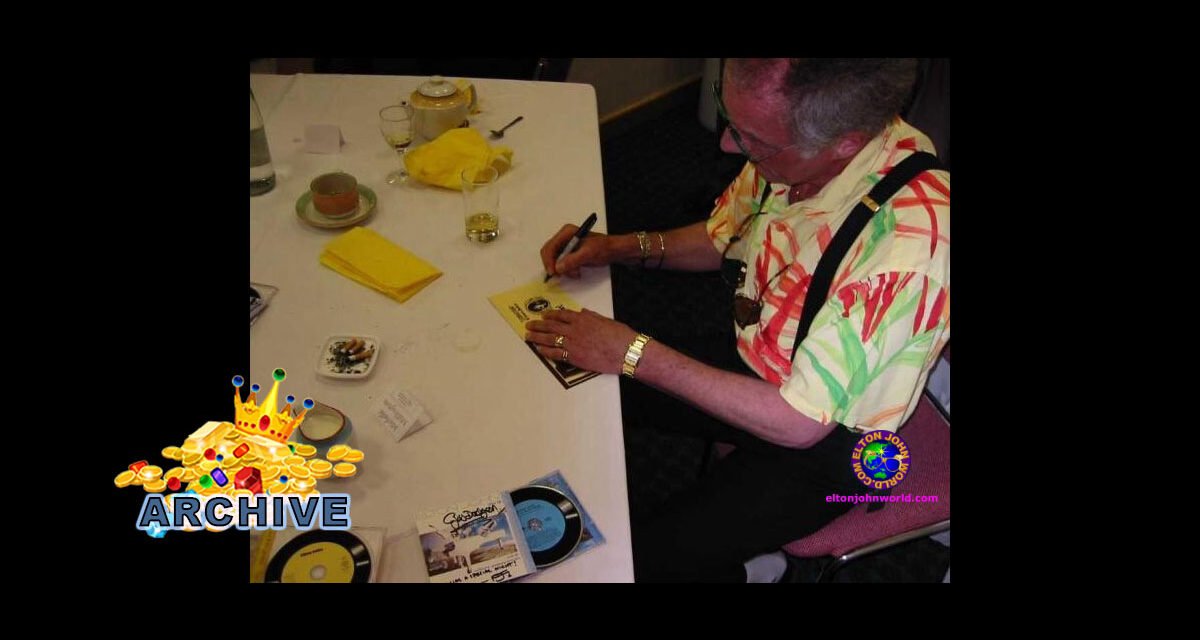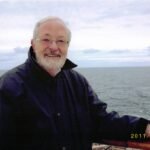Gus, Charlie and Roger – Part 2
Originally posted by George Matlock
01 July 2002
Our last Archive of the Month featured the first of a three-part interview with producer Gus Dudgeon and other Elton John associates. Here’s the next portion, which sees drummer Charlie Morgan discussing The Big Picture and Gus reflecting upon the Slave and Saturday Night’s Alright (For Fighting) sessions. We also hear a bit from another drummer, Roger Pope.
*Don’t forget to tune into our Gus Dudgeon tribute podcast episode. Special guests Murray Dudgeon and Chris Hook from the Gus Dudgeon Foundation. Visit rej.world today!*

Here we bring the part two of an interview involving a lot of interaction and productive debate between the helmsman and his musicians. Producer Gus Dudgeon and drummers Charlie Morgan and Roger Pope talk about working with Elton’s music during the London banquet dinner organised by the Ultimate Elton John Tour.
The bigger dubbing picture
Tour organiser Dale Berryhill: I want to switch the questions to Charlie Morgan. I love The Big Picture. I feel like I’m in Alcoholics Anonymous.
Sue: Not anonymous, we know what their names are! Ha!
Dale: This album a lot of people say they don’t like for being over-synthesised. I love to listen to it. I just told Charlie, and he says he loves the album too. Charlie will you tell us a little bit about your opinion. There’s no drum machine, just you?
Charlie Morgan: No, but there are a lot of loops. But I was commissioned by Elton to get a lot of loops a week before we started on the album. I went there armed with a whole bunch of loops on a sampler. We took the loops, cut them up, and then I put acoustic drums over them afterwards. So, there is a lot of loopage going on there.
Dale: What were the sessions like because I am sure you realised as you were making it that this had a different sound from virtually anything else you’d done?
Charlie: Yeah, very much so. When we were working with Gus, to a large extent we would complete a rhythm track and then move onto the next track. Eventually overdubs were done and the way we used to work. On The Big Picture, each track was done from beginning to end, taking three days to do each song. The result was that there would be a lot of sitting around for various members of the band. While other band members did their bits. It’s another way of working. Not necessarily a way I like myself. I liked doing the rhythm section, people bouncing off each other. Elton was sitting around too. He’d normally between 9am and 11am try to write some songs and put them down as a demo. And then we’d work on a song from then on for three days making successive overdubs.
Dale: What was the reason for this different approach?
Charlie: That’s something you have to ask Chris Thomas. That’s the way he likes to work. Likes to get something completed from beginning to end. I would prefer to have the whole rhythm section in there playing two or three songs a day and ten overdubs would be done afterwards as you call the band back in. I feel that you then give that continuity to an album. My personal opinion. There’s a synergy.
Gus: There’s nothing to top it. You’ve rehearsed a song a few times, you’ve recorded odd bits you are not sure about where you have two or three options. And go with the best version. And you finally get to that point where you are going to put the red light on, and you are actually getting serious with take one. You put the red light on, and you actually don’t know what’s going to happen. It’s a magic moment, because you have four or five great musicians sitting in there, and they’re waiting to play something they know and have a feeling about it. During the course of the next four takes, the thing goes up in quality. Then it levels off. Then you get two or three takes where it is at its peak. You get a situation where you might suddenly say ‘I’d love to hear a great drum fill to make it take off’ something to kick the song in. You suggest to the drummer. The drummer might not know what you mean, but there is nothing to top that sort of not knowing as soon as the track starts. As soon as it feels like a master, you know. The band knows. They snap in. Then it might drift off a bit and everyone might need a break.
Dale: So, for example, a song like Slave, which in my opinion started off ridiculously fast, you then gave it to Davey Johnstone and he slowed it down.
Gus: I can’t really remember. I think Elton just decided we’d recorded the song too bloody fast and next time we should slow it down. One of his thoughts.
Dale: Was it on Saturday Night’s Alright they were trying to play it as a piano song?
Gus: Well he was just playing too much over it. He was getting in the way for the band. So then he agreed that he’d sing and the band would play along. That’s the only time I am aware he’s done that on my recordings. That’s when things snapped into focus as I said.
Roger: [Gus] I have discovered the best person to work for.
Charlie: I’ll second that.
Gus: Stop it!
Roger: We used to meet up in the morning in The Ship in Wardour Street [London], right, work at the Marquis Studios. And we’d go in there and we’d do it! We’d do it! And we might take a whole day just to do a number. But we wouldn’t just take a whole day. We used to smoke some serious dope. Ha!
Short-changed by Penny?
A fan: What do you think of the production of Songs from the West Coast?
Gus: I don’t like it. But it always sounds like sour grapes. If I say it’s really great it looks like fake praise. You can’t answer the question.
Charlie: Gus, what about Made In England as an album?
Gus: The thing is I don’t like Chris Thomas’ production.
Charlie: It’s Greg Penny.
Gus: Oh well, same thing.
Audience: Ha!
Gus: Shows how much attention I pay to credits!
Charlie: Greg was trying to make it a much more organic album. From my point of view, I know he really did do his best to make as many of us fit in the room at the same time, doing the same thing.
Gus: But don’t you think that the big difference is that when I was working with you guys, Elton was never around if he didn’t have to do something. And now he’s always around, all the time. Which means that he doesn’t trust the people who are doing it. I’m not saying as individuals. But it’s a corporate thing. He’s saying that he has to be around because they’re gonna do something which is wrong. Otherwise why would he be there? Which is odd. And I think that’s the producer’s fault. I wasn’t a big man, but somehow he [Elton] was able to trust and go off.
Charlie: I think you had a tight grip on things.
Gus: I don’t think I did. Maybe it’s why I have short sight! Elton is in the control room for everything, overdubs, everything.
Roger: He used to trust you implicitly.
Gus: It wasn’t just me. It was the whole bunch of people. If he’s not trusting that bunch now, it may be not that he’s not trusting that bunch, but that he’s not trusting what decisions are made by that bunch. So somewhere down the line he’s lost the faith in the people to carry things through. Think of the hours and days we did overdubs. He would never be around then come in when asked. He would be watching football or whatever. Then he’d come in when we said come in and have a listen. And when he’s finished doing what he had to do, he was off.
Tour organiser George Matlock: Gus do you think that has anything to do with the break in trust with his former manager John Reid?
Gus: It started before that.









